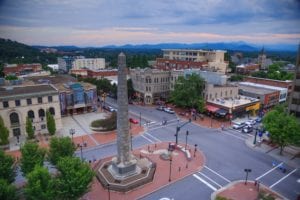Did you realize that every day, 10,000 Americans celebrate their 65th birthday? When the baby boomers reach that magic age, in 2030 nearly one-fifth of the country will be 65 or older. As in other parts of the country, the ‘senior’ population in the Triangle is growing by leaps and bounds and there’s no doubt that the Raleigh/Durham/Chapel Hill area will be joined by many more ‘like-minded’ in the coming decade. Though best known for research and development, the Triangle Region of North Carolina offers an abundance of services primarily aimed at the senior population. From education to care-giving, and living options to entertainment, the Triangle is rich in senior-related activities and benefits.
Housing options for older adults are plentiful in the region, thanks in part to advances in technology. The aging population has created a great demand for universal design. Easily accessible homes are not just for handicapped or disabled individuals. Your home should not only be an enjoyable and safe place for you to live, but also a comfortable place for your family and guests to visit.
Housing Options For The Aging
A good place to start looking, if you’re still in the housing search, is an organization like DHIC. The Downtown Housing Improvement Corporation is a non-profit organization dedicated to the development of high-quality housing communities, offering housing opportunities where seniors can thrive by living in safe, beautifully designed communities that remain affordable and feature a wealth of resident services. Senior housing is restricted to individuals who are age 55 (or in some cases, 62) and older. These communities are being developed in cities like Cary, Durham, and Raleigh. On the DHIC site, you’ll discover the availability of current housing opportunities as well as news of residences coming available.
Other housing options may be found on sites like 55places.com is an excellent resource for anyone searching for information about active adult communities in the Triangle or any other part of the U.S. The website offers unbiased information and reviews of active adult communities. The site’s wealth of information includes photos, videos, descriptions, floor plans, listings of homes for sale and reviews about nearly every 55+ and active adult community in the region.
If you’ve already found your forever home in the Triangle, but feel like you may need a bit more senior assistance, there are great resources available.
Specialized Services
The Alzheimer’s Association provides services to the eastern NC community. Support groups are led by qualified staff and volunteers throughout the region and are offered regularly. Education programs are also available for the general public, both online and in-person, with information on diagnosis, warning signs, communication, living with Alzheimer’s disease, and caregiving techniques.
The Arc of the Triangle partners with people with intellectual and developmental disabilities (I/DD) and their families to help them achieve their life goals. For instance, there is Supported Retirement (Wake County), a therapeutic community service designed to enhance the quality of life of older individuals with I/DD and may not have prepared for their retirement. That’s where services like Supported Services (Wake) come in.
The Durham Center for Senior Life (DCSL) is an independent non-profit organization designated by the State of North Carolina as a Center of Excellence. With four senior centers, including the downtown Durham Center for Senior Life, the DCSL offers a wide array of programs and services for older adults. Services include congregate meals, transportation, adult education, exercise classes, socialization, health promotion, caregiver support services, information referrals, and case assistance. In addition, the DCSL operates the only Adult Day Health Center in Durham.
Resources for Seniors, Inc. serves older adults and adults with disabilities in Wake County by providing home and community-based services and information so that they can maximize their choices for independence, comfort, safety, security, and well-being. They provide information and support for decision making, and also direct services such as home care, adult daycare, senior centers, home repair, and more. In the Community Resource Database, you’ll be able to search to find lots of specifics about programs in Wake County. The Directory of Resources for Older and Disabled Adults in Wake County is a searchable PDF version that you can print or save to your computer for future use. There are also resource lists for home care, long-term care, housing, etc., focused on particular topics. If you should need info for Orange, Durham, or other counties in the region, Triangle J Council of Governments is a good place to start.
Available Healthcare Choices
In addition to the Triangle’s excellent healthcare facilities (see our Health and Wellness article), the area is rich with related services guaranteed to offer the valuable senior assistance. The Department of Social Services Support for Aging Adults is active and available in each county. Their mission is to partner with individuals, families, and the community to help residents achieve physical, social, and financial well-being. Their goal is to see that every senior age 55 or older has access to quality services. For Orange County: (http://www.orangecountync.gov/154/Aging). In Wake County: (http://www.wakegov.com/humanservices/social/senior_adult).
Of course, public health departments have become a more broad-based health division capable of focusing on the overall health. Today these departments screen and treat many common maladies and offer immunizations, as well as early detection and monitoring of problems like hypertension and diabetes (with a particular emphasis on the needs of seniors). The Durham County Department of Public Health is located on East Main Street in Durham. In Orange County, the address is Homestead Road, Chapel Hill, or on the web at (https://www.orangecountync.gov/204/Health-Department). For Wake County go to Sunnybrook Road, Raleigh, or visit them at (http://www.wakegov.com/humanservices/Pages/default.aspx).
Support For Aging Veterans
The Triangle does not forget its veterans. For veterans’ services providing effective counsel on veterans’ benefits offered by the federal, state, and local government go to the Durham County Human Services Building on East Main Street or online: (http://dconc.gov/government/departments-f-z/veteran-services). If you live in Orange County go to Orange County Department of Social Services, Mayo Street, Hillsborough, or visit Orange County DSS Hillsborough Commons. Online: (https://www.orangecountync.gov/1829/Veteran-Services). In the Raleigh area visit the office on Falstaff Road, Raleigh, or online: (http://www.wakegov.com/veterans/Pages/default.aspx).
Senior Clubs And Educational Opportunities
Everywhere you look in the Triangle, there are activities for all ages. For instance, take the City of Raleigh Parks and Recreation Adult Program. There are many activities offered to all adults (a wide assortment to seniors only) including sports leagues, one-day and overnight trips each year including cruises and international travel, educational seminars and workshops, and various exercise and wellness classes. There are more than 30 Senior Clubs affiliated with the adult program. For more information on the entire Parks and Rec Adult Program online.
For those seniors wanting to continue their ‘learning’ experiences, many Triangle colleges and universities offer free or reduced tuition classes. North Carolina State University in Raleigh offers a tuition-free option for senior North Carolina residents during spring and fall. Also, the Osher Lifelong Learning Institute (OLLI) at NC State provides noncredit short courses, study trips, and special events for adults aged 50+. There is also an OLLI on the Duke University campus.
The University of North Carolina at Chapel Hill offers a tuition waiver program for legal residents of the state who are 65+. Seniors can attend any classes for credit or noncredit. In addition to the tuition waiver, the Friday Center at UNC-Chapel Hill is an expanding center for continuing education.
Cultural activities abound in the region. A good example is Duke University’s Music Department presenting many free (and some reasonably priced) concerts, lectures, and master classes throughout the year. For specifics, visit Duke University Music Department’s website for the full list.
But the fun doesn’t stop in just the Triangle region since it’s less than 4 hours from the beautiful Blue Ridge Mountains and less than 3 hours from the Carolina coast! With all the Triangle offers, why would one want to live anywhere else?




